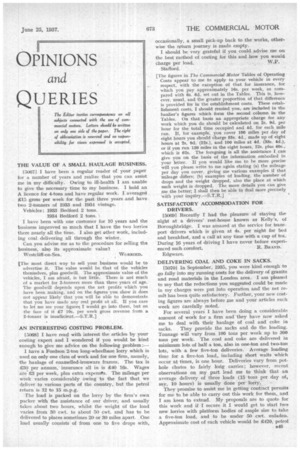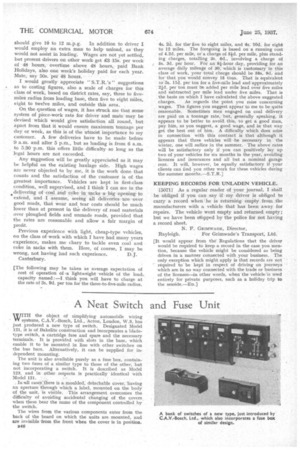OPINIONS
Page 59

Page 60

If you've noticed an error in this article please click here to report it so we can fix it.
and
QUERIES
THE VALUE OF A SMALL HAULAGE BUSINESS.
[50671 I have been a regular reader of your paper for a. number of years and realize that you can assist me in my difficulty. Owing to ill-health I am unable to give the necessary time to my business. I hold an A licence for 4-tons and have regular work. I averaged 415 gross per week for the past three years and have two 2-tonners of 1933 and 1934 vintage.
Vehicles : 1933 Bedford 2 tons.
1934 Bedford 2 tons.
I have been with one customer for 10 years and the business improved so much that I have the two lorries there nearly all the time. I also get other work, including coal delivering all through the winter.
Can you advise me as to the procedure for selling the business, also its approximate value?
Westcliff-on-Sea. WORRIED.
[The most direct way to sell your business would be to advertise it. The value would be that of the vehicles themselves, plus goodwill, The approximate value of the vehicles, I am afraid, is hut little. There is not much of a market for 2-tonners more than three years of age. The goodwill depends upon the net profits which you have been making, and on the figures you show it does not appear likely that you will be able to demonstrate that you have made any real profit at all If you care to let me see your figures I would go into them, but on the face of it £7 10s. per week gross revenue from a 2-tonner is insufficient.—S.T.R.]
AN INTERESTING COSTING PROBLEM.
[50681 I have read with interest the articles by your costing expert and I wondered if you would be kind enough to give me advice on the following problem:—
I have a Fordson 2-ton long-wheelbase lorry which is used on only one class of work and for one firm, namely, the haulage of enamelled-ironware frames. The tax is £30 per annum, insurance all in is £40 16S. Wages are £.3 per week, plus extra expensts. The mileage per Week varies considerably owing to the fact that we deliver to various parts of the country, but the petrol return is 12 to 15 m.p.g.
The load is packed on the lorry by the firm's own parker with the assistance of our driver, and usually takes about two hours, whilst the weight of the load varies from 30 cwt. to about 50 cwt. and has to be delivered to places sometimes 20 or 30 miles apart. One load usually consists of from one to five drops with,
occasionally, a small pick-up back to the works, otherwise the return journey is made empty.
I should be very grateful if you could advise me on the best method of costing for this and how you would charge per load. W.P. Stafford.
[The figures in The Commercial Motor Tables of Operating Costs appear to me to apply to your vehicle in every respect, with the exception of that for insurance, for which you pay approximately 16s. per week, as compared with 65. 6d. set out in the Tables. This is, however, usual, and the greater proportion of that difference is provided for in the establishment costs. These establishment costs, I should remind you, are included in the haulier's figures which form the second column in the Tables. On that basis an appropriate charge for any work which you do should be calculated on 2s. 9d. per hour for the total time occupied and 4d, for each mile run. If, for example, you cover 100 miles per day of eight hours you should charge 55s. ad., made up of eight hours at 2s. 9d. (22s.), and 100 miles at 4d. (33s. 4d,), or if you run 120 miles in the eight hours, 22s. plus 40s., which is 62s. The foregoing is all the assistance I can give you on the basis of the information embodied in your letter. If you would like me to be more precise will you please write to me again stating (a) the mileage per day you cover, giving me various examples if that 'mileage differs; (b) examples of loading, the number of drops and the weight dropped, also the place at which such weight is dropped. The more details you can give me the better; I shall then be able to deal more precisely with your inquiry.--S.T.R.]
SATISFACTORY ACCOMMODATION FOR DRIVERS.
[50691 Recently I had the pleasure of staying the night at a drivers' rest-house known as Kelly's, of Boroughbridge. I was amazed at the service for transport drivers which is given at 4s. per night for bed and breakfast, and a call at any time with a cup of tea. During 16 years of driving I have never before experi
enced such comfort. R. BR MID. Edgware.
DELIVERING COAL AND COKE IN SACKS.
[50701 In September, 1935, you were kind enough to go fully into my running costs for the delivery of granite and road materials in the London area. I am pleased to say that the reductions you suggested could be made in my charges were put into operation and the net result has been quite satisfactory. Further, your new costing figures are always before Jae and your articles each week are carefully, noted.
For several years I have been doing a considerable amount of work for a firm and'they have now asked me to deal with their haulage of coal and coke in sacks. They provide the sacks and do the loading. Tonnage will vary from 100 tons per week up to 300 tons per week. The coal and coke are delivered in minimum lots of half a ton, also in one-ton and two-tort lots, with a few five-ton deliveries. Average loading time for a five-ton load, including short waits which occur at times, is one hour. Deliveries vary from pothole chutes to fairly long carries ; however, recent observations on my part lead me to think that an average delivery of three loads (15 tons per day of, say, 10 hours) is usually done per lorry.
They promise to assist me in getting contract permits for me to be able to carry out this work for them, and I am keen to extend. My proposals are to quote for this work and if I secure it I would get to start two new lorries with platform bodies of ample size to take a five-ton load, and to be under 50 cwt. unladen. Approximate cost of each vehicle would be £420, petrol should give 10 to 12 m.p.g. In addition to driver I would employ an extra man to help unload, as they would not assist in loading. Wages are not yet settled, but present drivers on other work get £3 15s. per week of 48 hours, overtime above 48 hours, paid Bank Holidays, also one week's holiday paid for each year. Mate, say 50s. per 48 hours.
I would greatly appreciate " S.T.R.'s " suggestions as to costing figures, also a scale of charges for this class of work, based on district rates, say, three to fivemiles radius from loading base, then five to eight miles, eight to twelve miles, and outside this area.
• OR the question of wages, it has struck me that some system of piece-work rate for driver and mate may be devised which would give satisfaction all round, but apart from that it would ensure maximum tonnage per day or week, as this is of the utmost importance to my customer. A few deliveries have to be made before 9 a.m. and after 5 p.m., but as loading is from 6 a.m. to 5.30 p.m. this offers little difficulty so long as the legal hours are not exceeded.
Any suggestion will be greatly appreciated as it may be helpful on the existing haulage side. High wages are never objected to by me, it is the work done that counts and the satisfaction of the customer is of the greatest importance. Vehicles are kept in first-class condition, well supervised, and I think I can see in the delivering of coal and co'k0 in sacks • a big openingto extend, and I assume, seeing all deliveries are over good roads, that wear and tear costs should be much lower than at present in the delivery of road materials over ploughed fields and unmade roads, provided that the rates are reasonable and allow a fair margin of profit.
Previous experience with light, cheap-type vehicles, on the class of work with which I have had many years experience, makes me chary to tackle even coal and coke in sacks with them. Here, of course, I may be wrong, not having had such experience. D.J. Canterbury.
[The following may be taken as average expectation of
• cost of operation of -a lightweight vehicle of the load.. capacity named :—I think you will have to charge at the rate of 3s. 9d. per ton for the three-to-five-mile radius, 4s. 2d, for the-five to eight miles, and 4s. 10d. for eight to 12 miles. The foregoing is based on a running cost of 4.2d. per mile, or a charge of 5i.d. per mile, plus standing charges, totalling 3s. 8c1., involving a charge of 5s. 3d. per hour. For an 8i-hour day, providing for an average daily mileage of 30; which is customary in this class of work, your total charge should be 58s. 9d. and for that you would convey 15 tons. That is equivalent to 3s. lid, per ton for a five-mile lead and approximately 21d, per ton must lie added per mile lead over five miles and subtracted per mile lead under five miles. That is the basis on which I have calculated the above suggested charges. As regards the point you raise concerning wages. The figures you suggest appear to me to be quite reasonable. Sometimes men engaged on coal delivery are paid on a tonnage rate, but, generally speaking, it appears to be better to avoid this, to get a good man, pay YAM, as you suggest, a good wage, and in that way get the best out of him. A difficulty which does arise in connection with this contract is that although it appears that three vehicles will be necessary In the winter, one will suffice in the summer. The above rates will be satisfactory only if you can positively lay up two of your vehicles for six months in the year, avoiding licences and insurances and all but a nominal garage rent. It will, however, be equally satisfactory if your clients can find you other work for these vehicles during the summer months.—S.T.R.]
KEEPING RECORDS FOR UNLADEN VEHICLE.
L5071] As a regular reader of your journal, I shall be obliged if you can say if my driver is obliged to carry a record when he is returning empty. from the manufacturers with a vehicle that has been away for repairs. The vehicle went empty and returned empty ; but we have been sttpped by the police for not having a record sheet.
N. F. GRIMWADE, Director,
Rayleigh. For Grimwade's Transport; Ltd.
[It would appear from theRegulations that the driver would be required to keep a record in the case you mention, because the vehicle might be considered as being driven in a manner connected with your business. The only exception which might apply is that records are not required to" be kept in respect of driving on journeys which are in no way connected with the trade or business of the licensee—in other words, when the vehicle' is used entirely for private purposes, such as a holiday trip to the seaside.—En.]




























































































